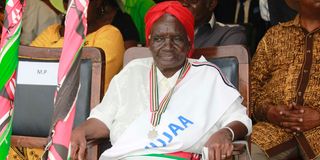Lessons to pick from trailblazer Grace Onyango

Mama Grace Onyango at Jomo Kenyatta Sports Ground in Kisumu during Madaraka Day celebrations in 2015. Hailed as a ‘woman of firsts’, the first woman mayor of Kisumu will be laid to rest today at her home in Gem, Siaya County.
What you need to know:
- The first woman councillor of Kisumu Central Ward, Hon Grace Onyango, became the pioneer female mayor of Kisumu Town.
- The first legislature she served in (1969 – 1974) suffered typical male dominant behaviours.
- In 1973, she challenged the suggestion by Hon Permenas Munyasia that married women applying for government houses must include their husbands’ names to qualify.
Today’s burial of Grace Akech Onyango (June 26, 1924 – March 8, 2023) marks the end of an epoch regarding the inclusion of women in Kenya’s political leadership. The first woman councillor of Kisumu Central Ward, Hon. Onyango became the pioneer female mayor of Kisumu Town and, to date, one of the only two women to have occupied the position, having succeeded Mathias Ondiek, who died in office in 1965. The other is Prisca Auma Misachi.
On the way up, Ms Onyango trounced six male competitors. The Kisumu Municipal Council did not have a single woman in its ranks. In response, Hon Onyango decreed that whenever a male employee died or retired, he would be replaced by his widow/wife, sister or daughter. To lead by example, she adopted Ondiek’s widow as the ‘mayor’s wife’.
In 1969, Ms Onyango was elected the first female Member of Parliament, having whitewashed 10 male competitors. She was also the first female deputy speaker of the National Assembly (1979-1984); secretary-general of the Luo Union East Africa; assistant commissioner of the Girl Guides Association; and chair of Child Welfare Society, Kisumu District.
Male dominant behaviours
Her legislative concern with gender equality surfaced on April 14, 1976, when Hon John Osogo complained that a proposed committee on squatters could end up just handling personal matters such as of men who had grabbed others’ wives. Ms Onyango criticised this as objectification of women.
The first legislature she served in (1969 – 1974) suffered typical male dominant behaviours. For instance, when Hon Livingstone Marita highlighted that she had been referred to as a “girl” by the Attorney-General on November 20, 1970, Deputy Speaker Munyua Waiyaki, paternalistically and condescendingly replied that “this [was] a nice way of calling a lady”.
On July 3, 1973, Ms Onyango challenged the suggestion by Hon Permenas Munyasia that married women applying for government houses must include their husbands’ names to qualify. She thus dismissed the norm that women derive their status from men. During debate on July 12, 1973, Hon Ibrahim Abdallah referred to her as “very beautiful without applying artificial make-up” and insinuated that this is what attracted Mr Onyango to marry her.
Corporal punishment
This obsession with women legislators’ appearance, technically called “tokenism eclipse,” is used to imply that they are merely in decision-making spaces for aesthetic purposes.
While debating the Marriage Bill on July 19, 1979, Hon Wafula Wabuge opposed Clause 73, which stated that “notwithstanding any customs to the contrary, no spouse shall have any right to inflict corporal punishment on the other.”
He opined that in African culture, “if you do not slap your wife, she will not know that you love her.” In response, Ms Onyango challenged him to explain whether he believed that love was defined by violence, thus dismissing the culture argument to perpetuate harm.
Ms Onyango also stood out as a defender of other marginalised groups in what is technically referred to as symbolic consequences, where women assume the responsibility of representing all disadvantaged categories. This manifested on July 20, 1979, when she asked that people with disability be accorded dignity and implored the government to establish provincial vocational training centres where they could acquire skills for self-reliance.
She further requested that their issues be mainstreamed in all government departments instead of confinement to the Department of Social Services. By this, Ms Onyango was identifying what is now known as compartmentalisation, a bureaucratic form of resistance to equality issues.
Affirmative action
On August 23, 1979, she decried the fact that police officers with families were sharing houses, hence lacked privacy, and asked for non-discrimination when allocating government employment opportunities.
What are the enduring lessons from Ms Onyango? She neither benefitted from affirmative action nor moaned about a lack of resources for political campaigns. Instead, she succeeded through a clear agenda, rapport with the electorate, personal determination and track record.
After leaving politics, she led a quiet and respectable life without obsequiously pleading her way back to public life through patronage like today’s nauseating Kenyan politician. Ironically, official recognition for her trooped in only in her sunset.
In 2020, the County Government of Kisumu rebranded Kisumu Social Hall to bear her name.
Last year, she received the Kenya Eminent Women Trailblazers Award and had the Mama Grace Onyango Foundation for Digital Health launched by African medical professionals and researchers.
Coming shortly before her death, these accolades look like premonitory valedictions. Notably, her demise on International Women’s Day is a symbolic statement that she did her part and is blessing women for the remaining journey.
The paucity of studies on Ms Onyango makes it incumbent upon scholars to analyse her contributions to gender equality, which is not to dismiss Phoebe Musandu’s 2006 thesis titled Daughter of Odoro: Grace Onyango and the African Women’s History.
Dr Miruka is an international gender and development consultant and scholar. ([email protected])





